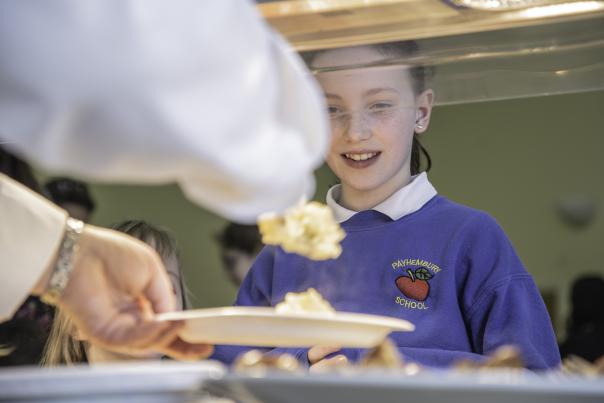
It comes as a result of work by the Small Schools Taskforce, which has been running trials, developing menus and identifying the equipment to ensure that even the smallest schools can provide hot school meals without being a drain on school resources.
The new initiative is part of the overall School Food Plan aim of well-trained caterers serving freshly-prepared, tasty and nutritious food to at least 70% of all pupils.
James Mills, chair of the Small Schools Taskforce, said: “We knew that to ensure all children are able to enjoy nutritious school food we would need to tackle the problem of schools with fewer children.
“There are a number of challenges and we are therefore providing headteachers with the tools that make them reconsider school food as an integral part of the school day.
“Part of that means taking a whole school approach to food, not only meeting the needs of children, but also providing cultural and social benefits.”
Government plans for free school meals for infants are expected to pose particular challenges for small schools, which may have too few pupils to run a profitable lunch service conventionally or may even have no kitchen or dining facilities.
Working with industry partners such as equipment suppliers PKL and food companies such as Brakes, the Taskforce has identified solutions it believes work even in small schools.
The new plans include KitchenPods, fully self-contained kitchens that can be delivered to schools and can be up and running within a matter of hours.
It has also developed menu options that it says are affordable and comply with the School Food Plan’s goal of healthy, fresh, nutritious food.
These include favourites such as spaghetti bolognese, roast beef and yorkshire pudding and macaroni cheese. A fresh fruit and freshly prepared salad bar will feature every day as part of a complete overhaul of the traditional school meals service.
Penny Hammett, headteacher of Payhembury C of E Primary School in Devon, which has been trialling the new menus, said: “We were very disappointed when we had to stop our school meals a couple of years ago because it was not cost-effective.
“I am aware of the importance of proper nutrition, so I was really pleased to be approached by the Small School Taskforce.
“We are delighted that we can now offer school meals that the children genuinely love, whilst ensuring they are eating healthy, fresh, nutritious hot food.”
The menus have been developed with leading food writer Annabel Karmel, who said: “Healthy meals can be a hit with children – as long as they look good and taste great – and that’s been the challenge up until now, particularly in small schools that have limited facilities to provide hot, quality meals.
“Lots of larger schools are already doing great things to instil good eating habits, so it’s about taking lessons from the best and devising an economically viable model to assure every school child of a hot, healthy, tasty meal; and that’s exactly what I’ve done with the Small Schools Taskforce.”
Brad Pearce, project manager of the Taskforce added: “Working with a collaborative group of food producers, equipment suppliers and the schools themselves, we have developed a formula that will work.
“Our calculations show that we can run a breakeven school service serving less than 40 meals a day.
“We are working with a small number of schools in the West Country to prove that the formula works, and the outcomes will be openly available in the Small schools Taskforce Report, later this year. This pilot will then become a potential blueprint for small schools all over the country as they strive to feed their children hot food from September 2014.”